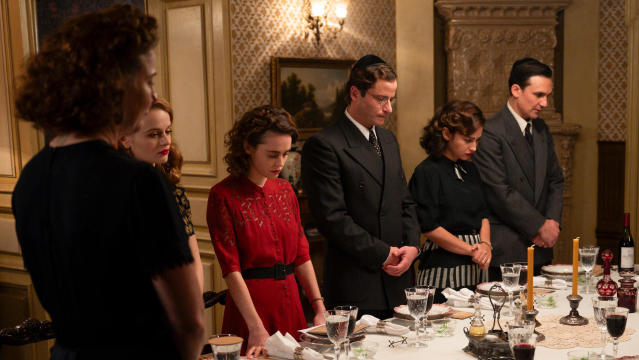In the realm of film and television scoring, collaboration is key to creating a cohesive and emotive musical landscape that enhances storytelling. Such was the case for co-composers Rachel Portman and Jon Ehrlich, who joined forces across continents to score Hulu’s poignant series “We Were the Lucky Ones.” Despite the geographical distance between them, Portman and Ehrlich embarked on a creative journey that resulted in a captivating and evocative soundtrack. In this article, we explore their collaborative process, the thematic elements of the score, and the impact of music in conveying the emotional depth of the Holocaust narrative portrayed in the series.
Meeting Across Continents: The collaboration between Rachel Portman and Jon Ehrlich for “We Were the Lucky Ones” began with an unconventional twist—they had only met in person once. Despite this, they forged a strong creative connection and navigated the complexities of remote collaboration with ease. Portman and Ehrlich’s ability to work seamlessly across continents speaks to the power of technology in fostering artistic collaboration and innovation in the digital age.
Crafting the Musical Landscape: As co-composers, Portman and Ehrlich faced the formidable task of crafting a musical landscape that would complement and enhance the narrative of “We Were the Lucky Ones.” Set against the backdrop of the Holocaust, the series demanded a score that would evoke a wide range of emotions—from heartbreak and despair to resilience and hope. Through their collaborative efforts, Portman and Ehrlich succeeded in creating a multifaceted soundtrack that captured the essence of Georgia Hunter’s best-selling novel and brought its characters to life on screen.
Themes of Resilience and Hope: At the heart of “We Were the Lucky Ones” lies a story of resilience, courage, and the enduring power of hope in the face of unimaginable adversity. Portman and Ehrlich’s score serves as a musical embodiment of these themes, weaving together melodies that evoke a sense of perseverance and optimism amidst darkness. From stirring orchestral arrangements to delicate piano motifs, the score reflects the indomitable spirit of the characters as they navigate the horrors of war and strive to find light in the darkness.
Collaboration in Action: Portman and Ehrlich’s collaborative process was marked by a spirit of mutual respect, creativity, and shared vision. Despite working in different time zones, they embraced the challenges of remote collaboration and leveraged technology to their advantage. Ehrlich aptly describes their dynamic as “passing the baton back and forth,” with each composer building upon the other’s work to create a cohesive and seamless musical tapestry. Through their collaborative efforts, Portman and Ehrlich demonstrate the transformative power of music in storytelling and the importance of collaboration in the creative process.
The Impact of Music: In “We Were the Lucky Ones,” music plays a pivotal role in shaping the emotional landscape of the series and connecting viewers to the characters’ experiences on a deeper level. Portman and Ehrlich’s score serves as a powerful tool for eliciting empathy, fostering understanding, and honoring the resilience of those who endured the Holocaust. Through their evocative compositions, they invite audiences to bear witness to the triumph of the human spirit in the face of unimaginable suffering.
The collaborative journey of co-composers Rachel Portman and Jon Ehrlich for “We Were the Lucky Ones” is a testament to the transformative power of music and the art of storytelling. Through their creative partnership, they have crafted a soundtrack that not only enhances the narrative of the series but also resonates with audiences on a profound emotional level. As viewers immerse themselves in the world of “We Were the Lucky Ones,” they are invited to experience the enduring power of hope, resilience, and the indomitable human spirit—a testament to the enduring legacy of those who survived the Holocaust.
